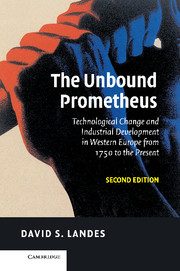 The Unbound Prometheus
The Unbound Prometheus 2 - The Industrial Revolution in Britain
Published online by Cambridge University Press: 05 June 2014
Summary
In the eighteenth century, a series of inventions transformed the manufacture of cotton in England and gave rise to a new mode of production—the factory system. During these years, other branches of industry effected comparable advances, and all these together, mutually reinforcing one another, made possible further gains on an ever-widening front. The abundance and variety of these innovations almost defy compilation, but they may be subsumed under three principles: the substitution of machines—rapid, regular, precise, tireless—for human skill and effort; the substitution of inanimate for animate sources of power, in particular, the introduction of engines for converting heat into work, thereby opening to man a new and almost unlimited supply of energy, the use of new and far more abundant raw materials, in particular, the substitution of mineral for vegetable or animal substances.
These improvements constitute the Industrial Revolution. They yielded an unprecedented increase in man's productivity and, with it, a substantial rise in income per head. Moreover, this rapid growth was self-sustaining. Where previously, an amelioration of the conditions of existence, hence of survival, and an increase in economic opportunity had always been followed by a rise in population that eventually consumed the gains achieved, now for the first time in history, both the economy and knowledge were growing fast enough to generate a continuing flow of investment and technological innovation, a flow that lifted beyond visible limits the ceiling of Malthus's positive checks.
- Type
- Chapter
- Information
- The Unbound PrometheusTechnological Change and Industrial Development in Western Europe from 1750 to the Present, pp. 41 - 123Publisher: Cambridge University PressPrint publication year: 2003
- 1
- Cited by
